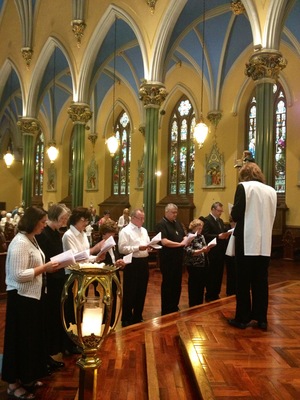
"Among the means of holiness most useful and opportune for the defense of and progress of Christian faith and morals in our day, we recognize the Dominican Third Order as one of the most eminent, easy, and secure."
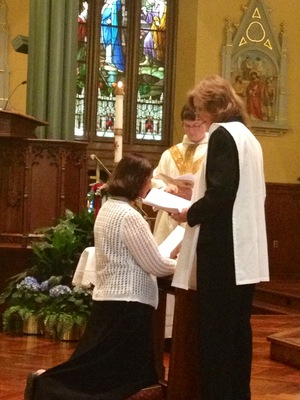

"Among the means of holiness most useful and opportune for the defense of and progress of Christian faith and morals in our day, we recognize the Dominican Third Order as one of the most eminent, easy, and secure."

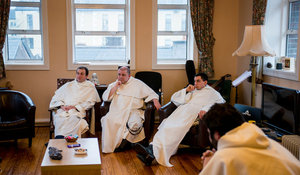
The link this article, "For Friars, Finding Renewal by Sticking to Tradition," leads you to a story about the Irish Dominicans who have had a resurgence in vocations by a keen attention to their tradition and the Church's. While the author concentrates on the wearing of the habit, there are other things that have been recovered: an authentic companionship (communal life), faithfulness to the Church, the wearing of the habit and the common, evangelical mission and conversion of mind and heart. Kudos for the Irish OPs in recognizing the signs so as not to diminish further, or even die.
I can't help but think that George Weigel's latest book, Evangelical Catholicism, reflects what the future of the Church will be, including life in religious orders, not only in the USA, but around the world. You have to read, and re-read this book. Plus, I am tending to think that Cardinal Dolan was correct in saying that the Church in the USA is more concerned with the institution than she is with being missionary. Would that it be the case that the Benedictines could recognize what the Irish OPs did. I offer this article so that we all may share in the Irish OPs joy for their own renewal. We can benefit by their witness.

Pope Gregory XVI, a Benedictine monk, made gambling on papal elections punishable by excommunication.
Gregory I, Boniface IV, Adeodatus II, Leo IV, John IX, Leo VII, Stephen IX, Gregory VII, Victor, III, Urban II, Paschal II, Gelasius, II, Celestine V, Clement VI, Urban V, Pius VII, Gregory XVI
Honorius II, Innocent II, Lucius II, Adrian IV, Gregory VIII, Eugene IV
Nicholas IV, Sixtus IV, Sixtus V, Clement XIVSecular Franciscans have 2Pius IX, Leo XIII
Innocent V, Benedict XI, Pius V, Benedict XIII
Eugene III, Benedict XII
Paul IV
Francis
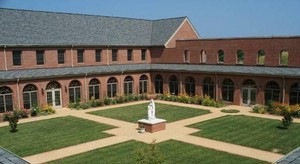 Some time ago I mentioned here on Communio the monastery in Linden, Virginia which getting a jim-start on living the monastic life according to the Dominican charism. St Dominic's Monastery is an exceptional place.
Some time ago I mentioned here on Communio the monastery in Linden, Virginia which getting a jim-start on living the monastic life according to the Dominican charism. St Dominic's Monastery is an exceptional place. 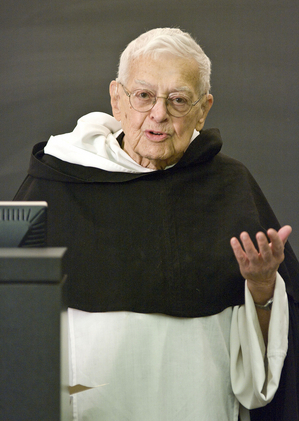 Word received this evening that the venerable theologian and priest, Father Benedict Ashley, OP, 97, died today. Father Benedict was a teacher of mine when I was in St Louis.
Word received this evening that the venerable theologian and priest, Father Benedict Ashley, OP, 97, died today. Father Benedict was a teacher of mine when I was in St Louis.The life of the Church is very interesting. Even such obscure things, seemingly that is, like that of the Papal Theologian, piques my wonder and awe at what is expected in our communal pursuit of Truth. And that's what the Papal Theologian helps us to do: seek the face of God. Perhaps in your seeking Truth, Beauty and Goodness you are genuinely curious about how the Church works and the people behind the work being done?
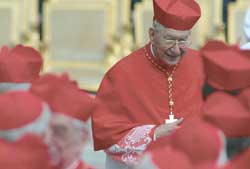
The Papal Theologian emeritus of the Papal Household, Georges Cardinal Cottier, OP, gave an interview to Jose Antonio Varela Vidal at Zenit (11 July 2012) about Blessed Pope John Paul II, with whom he worked intimately: "...he was a man of hope. When he said: 'Do not be afraid,' he certainly said it for the countries occupied by Communism, but he also said it because he saw that there was a certain decadence in the West. I would say he awakened the Church everywhere. Then, his love of life, this was fantastic and he witnessed this love of life in a life profoundly marked by illness, and young people understood him."
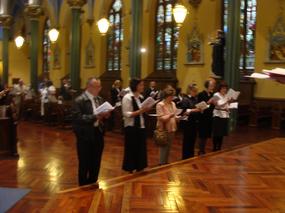 Many of the religious orders have what is called a Third Order Laity, or some such name for the laity who are closely connected spiritually and morally to an Order and continue to live their lives according to the vocation they've been given: the single life, married life or secular priesthood.
Many of the religious orders have what is called a Third Order Laity, or some such name for the laity who are closely connected spiritually and morally to an Order and continue to live their lives according to the vocation they've been given: the single life, married life or secular priesthood.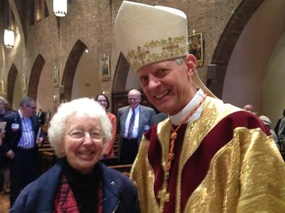 As I mentioned on Monday, we celebrated the feast of Saint Catherine of Siena at the New York City parish under her patronage with a solemn Mass offered by His Eminence, Donald Cardinal Wuerl, STD, archbishop of Washington. The Saint Catherine of Siena Award was bestowed on the Cardinal honoring him for his lifetime work for Catholic health care as was Sister Elaine Goodell, PBVM, for her 27 years as a Catholic chaplain at Memorial Sloan-Kettering Hospital. It is noteworthy that Sister Elaine began her ministry as a hospital chaplain at the age of 60 following a sabbatical from teaching music. This liturgical and professional observance was the Sixth Annual ceremony established by the Dominican Friars Healthcare Ministry of New York.
As I mentioned on Monday, we celebrated the feast of Saint Catherine of Siena at the New York City parish under her patronage with a solemn Mass offered by His Eminence, Donald Cardinal Wuerl, STD, archbishop of Washington. The Saint Catherine of Siena Award was bestowed on the Cardinal honoring him for his lifetime work for Catholic health care as was Sister Elaine Goodell, PBVM, for her 27 years as a Catholic chaplain at Memorial Sloan-Kettering Hospital. It is noteworthy that Sister Elaine began her ministry as a hospital chaplain at the age of 60 following a sabbatical from teaching music. This liturgical and professional observance was the Sixth Annual ceremony established by the Dominican Friars Healthcare Ministry of New York.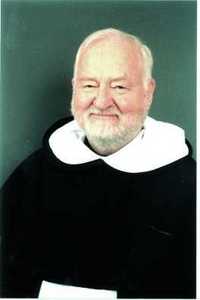 Earlier today Dominican Father Kevin O'Rourke, 84, died following being stricken by a stroke.
Earlier today Dominican Father Kevin O'Rourke, 84, died following being stricken by a stroke.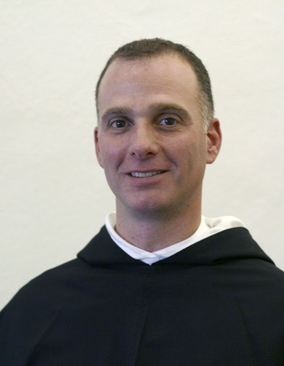 Several days ago the Dominican Friars of Saint Catherine of Siena Priory (NYC) elected Father Juan-Diego Brunetta, OP, as their new religious superior (their Father Prior).
Several days ago the Dominican Friars of Saint Catherine of Siena Priory (NYC) elected Father Juan-Diego Brunetta, OP, as their new religious superior (their Father Prior).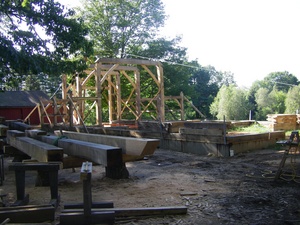 The Dominican nuns at Our Lady of Grace Monastery (North Guilford, CT) lost their barn this past winter with the constant snow fall. The old barn collapsed under the weight of lots of snow --it's poor, old legs couldn't bear the torment of heavy snow and ice. But the monastery needs a barn.
The Dominican nuns at Our Lady of Grace Monastery (North Guilford, CT) lost their barn this past winter with the constant snow fall. The old barn collapsed under the weight of lots of snow --it's poor, old legs couldn't bear the torment of heavy snow and ice. But the monastery needs a barn.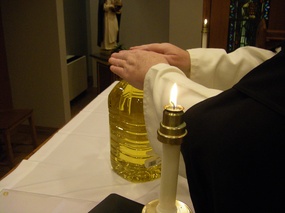
For centuries the Church has blessed olive oil as a sacramental for healing. Some will have oil blessed for lighting a lamp, bodily healing, and even some will use it in cooking. As a sacramental, oil is used in the same way we'd use Holy Water, Holy Salt, and holy images. The blessing given by the priest beseeches God through the intercession of Saint Jude to heal those who use the Oil protecting them from evil and giving the gift of good health of both mind and body. The Bible also speaks of the healing power of oil and its use also reminds us of our own consecration at the time of Baptism and again at Confirmation. This oil is blessed with the relic of St. Jude but is not to be confused with the Sacrament of Anointing of the Sick.
Today, asking for Saint Jude's intercession and using the relic of Saint Jude, Father Ken blessed Saint Jude Oil for the Dominican Shrine of Saint Jude. The Shrine is a ministry of the Church of Catherine of Siena --NYC.
If you would like to get Saint Jude Oil, write to the Shrine at 411 East 68th Street, New York, NY 10065. A $5.00 donation is requested to cover costs of mailing the Oil.
Blessing of Saint Jude Oil
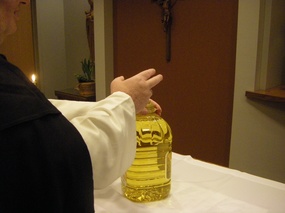
Priest: Our help is in the name of the Lord. All: Who made heaven and earth. God's creature, oil, I cast out the demon from you by God the Father + almighty, who made heaven and earth and sea, and all that they contain. Let the adversary's power, the devil's legions, and all Satan's attacks and machinations be dispelled and driven afar from this creature, oil. Let it bring health in body and mind to all who use it, in the name of God + the Father almighty, and of our Lord Jesus + Christ, His Son, and of the Holy Spirit, the Advocate, as well as in the love of the same Jesus Christ our Lord, who is coming to judge both the living and the dead and the world by fire.
All: Amen.
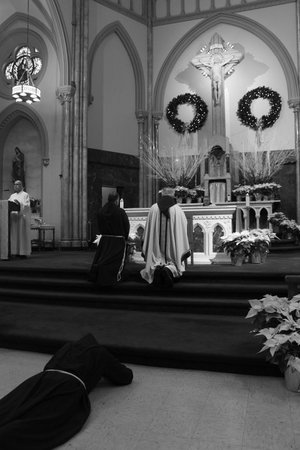 Several men have committed themselves more fully to the Lord and His Church today. A Benedictine monk, a Capuchin friar and Dominican deacons took vows or were ordained.
Several men have committed themselves more fully to the Lord and His Church today. A Benedictine monk, a Capuchin friar and Dominican deacons took vows or were ordained.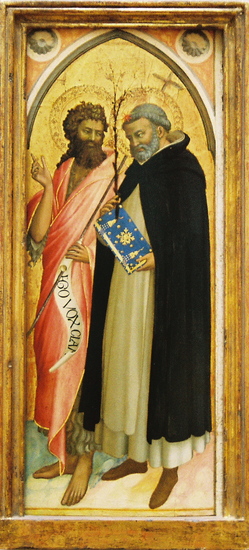 Last week the novices of the Order of Friars Preachers --the Dominicans of the Province of Saint Joseph-- heard the following talk by Dominican Father André-Joseph LaCasse. Father LaCasse is the pastor of the Church of Saint Gertrude, Cincinnati, OH. I am not a Dominican but I have great affection for the Dominican vocation and many friends are of that persuasion, however many readers of this blog are not Dominicans. So, I thought after reading LaCasse's talk there is something we can all be helped by what was said about the fraternal life the Dominican Order. In my estimation Father LaCasse's thoughts are applicable to all states of the Christian life: the single person, the married couple, the Capuchin, the secular priest, bishop, etc. In the School of Community (of CL) we've been working on Father Luigi Giussani's notion of charity and sacrifice and are about to start the section on virginity. And I ask myself: How is it that as a Christian I live in a state of perpetual discernment of faith, hope and charity through a life of sacrifice? In what concrete ways do I live honestly? Well, I'm off to confession to find that out. You?
Last week the novices of the Order of Friars Preachers --the Dominicans of the Province of Saint Joseph-- heard the following talk by Dominican Father André-Joseph LaCasse. Father LaCasse is the pastor of the Church of Saint Gertrude, Cincinnati, OH. I am not a Dominican but I have great affection for the Dominican vocation and many friends are of that persuasion, however many readers of this blog are not Dominicans. So, I thought after reading LaCasse's talk there is something we can all be helped by what was said about the fraternal life the Dominican Order. In my estimation Father LaCasse's thoughts are applicable to all states of the Christian life: the single person, the married couple, the Capuchin, the secular priest, bishop, etc. In the School of Community (of CL) we've been working on Father Luigi Giussani's notion of charity and sacrifice and are about to start the section on virginity. And I ask myself: How is it that as a Christian I live in a state of perpetual discernment of faith, hope and charity through a life of sacrifice? In what concrete ways do I live honestly? Well, I'm off to confession to find that out. You?
You are privileged here because you live with friars who have lived this life for quite some time. In our community we have two jubiliarians, one who is close to being a jubiliarian, and the rest of us who have lived this life for over twenty years. Our lives as religious is a steady progress towards perfection, but a perfection that experiences many imperfections along the way. Our lives are not extraordinary. None of us has won prestige. None of us is in the limelight. We live ordinary lives of consecration, hoping that we can do our best to advance the cause of Jesus Christ and his Church.
The Dominican life is a life of prayer, study, and the apostolate. Most days are ordinary days where you are called to be simple servants of the Church. Do you desire to be a servant? Are you willing to die to your own desires in order to do the desire of God manifested through the will of our superiors? In a real sense you will not be able to answer this question until something is asked of you that takes real sacrifice and humility. But still the question needs to be asked now: Am I willing to die to myself and become a servant of the Church? The question needs to be answered now because from the very beginning of your discernment you must be brutally honest with yourself.